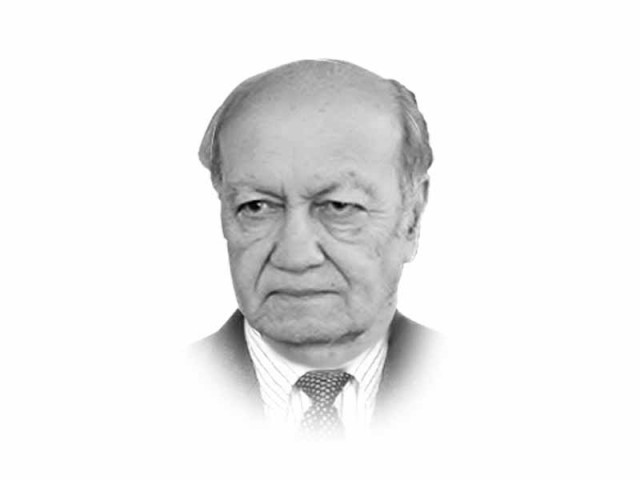Prevent drift towards anarchy
Once again the ugly spectre of the perennial civil-military divide has come to fore

The writer is a retired lieutenant general of the Pakistan Army and a former federal secretary. He has also served as chairman of the Pakistan Ordnance Factories Board
Once again the ugly spectre of the perennial civil-military divide has come to fore and exposed the weakness of Pakistan’s political structure. This outcome has implications as it will further weaken democracy and provide an opportunity to opposition parties and our foreign detractors to malign and intensify their pressure. So it is not just the government but also all major institutions and stakeholders are likely to lose. It would not be an exaggeration that the crisis, if not managed discreetly, can be as damaging as the one that occurred during General Raheel Sharif’s tenure between government and the army in late 2013.
The problem is also more fundamental. Pakistan from its very inception has suffered from the national malaise of an emaciated democracy, alternating between weak civilian governments and military dictatorship. And there is hardly any serious realisation and effort by the top leaders even after 70 years of our existence towards strengthening democratic institutions and correcting the lopsided civil-military balance. Main reason for this is that every institution is looking at national issues and challenges in a linear perspective through a narrow lens. Not that institutional interests are not important or can be set aside. The task is to weave them around the overall national interest so that both are addressed. This process can only be initiated and expedited provided the civilian government makes use of state institutions both for taking stock of national problems and decision-making. It would also require subordination of military to civilian authority and acceptance of democratic norms.

The present national picture is disconcerting as on every major issue institutions are pulling in opposite directions and there is lack of coherence and unity. Provinces, too, are pulling in different directions and a feeling of general waywardness is all around. Street politics will only add to the prevailing confusion. The main focus of top leaders is on name-calling and hardly any discussion on major issues is taking place. This trend could be very damaging in the national interest, especially when viewed in the backdrop of the internal challenge of terrorism and highly tense relations with India and Afghanistan. The army has an equally critical role in national course correction.
Although the fight against militancy has been fairly successful, it is years away from being over. A new danger lurks large due to the reported presence of the IS in Pakistan. The recent killings of Taliban members in K-P, apparently by the Islamic State is a demonstration of this emerging reality.
Moreover, it should not be overlooked that Pakistan is a nuclear power and the world expects responsible behaviour. Taking impulsive decisions in the backdrop of deep divisions between the top civilian leadership and military high command will be viewed with deep concern internationally.
Keeping the pressure on the government is what the opposition is supposed to do. The forum for this is supposed to be parliament. Public meetings on certain special occasions are fine but cannot be the main political activity. Street politics will only create more confusion and less substance. This will promote waywardness and chaos that this country can ill afford. It is also the responsibility of the political leaders to delve on issues. Merely parroting a one-point agenda whether it is corruption or any other will not achieve the desired results. It seems our political parties have run out of intellectual capital to address or converse on serious national issues especially as they relate to security, foreign affairs and the economy. Generally, our leaders begin their speeches in public with a quotation from the Holy Quran or Hadith but quickly drift into calling names and mean discourse depicting their worst face.
Indeed, what have really held back Pakistanis are a corrupt state and a society that is complacent and they are unable to actualise their potential and realise their ambition! All the power is concentrated and exercised by an elite that has scant interest in the welfare of the poor. They continue to raise issues that only appeal to their group or political class. It is therefore clear that unless power passes in the hands of ordinary people and the nature of political discourse changes nothing is going to change. Whereas elections will help in the transformation provided the monopoly of a few families that dominate politics is broken. These elites are so entrenched that despite their failures it becomes difficult to remove them. With their hold so pervasive it will only be possible provided a sustained movement of the civil society is launched. This should be accompanied by genuine democratisation of political parties through reform and internal pressure.
Highest priority should be given to defuse the current crisis and for this the prime minister should invite the COAS and take measures to allay the fears of the military leadership. Both sides should refrain from issuing statements and side stepping from normal rules of official business. As regards restoring the supremacy of the civilian government and the dejure authority of the prime minister much would depend on the performance of the civilian government. Recent history of civil-military relations in Turkey and Indonesia shows that as the performance of the civilian government improved it was able to assert itself by winning over the confidence of the people. It is then in a position to reclaim its constitutional position and restore the civil-military balance.
Published in The Express Tribune, May 3rd, 2017.
Like Opinion & Editorial on Facebook, follow @ETOpEd on Twitter to receive all updates on all our daily pieces.















COMMENTS
Comments are moderated and generally will be posted if they are on-topic and not abusive.
For more information, please see our Comments FAQ